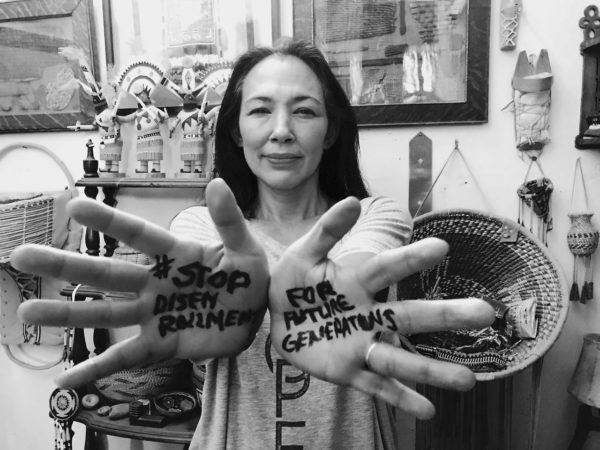
- Details
- By Native News Online Staff
SEATTLE — Next week, Indigenous people from around the country will put their hands forward to deliver a message on social media about the controversial tribal practice of disenrollment.
It is estimated that some 10,000 tribal citizens have been disenrolled by their tribes. Of the 574 federally recognized tribes, about 85—or 15 percent—have participated in this practice.
To fight back, Stop Disenrollment, a grassroots Indigenous effort, will resume its annual campaign this month for a fifth straight year. For the past four years, hundreds of Indigenous people have posted photos of themselves in a hand gesture, with words expressing opposition to disenrollment penned on their palms, on various social media platforms.
On Monday, February 10, Stop Disenrollment will resume for a fifth year.
During last year’s campaign, the Stop Disenrollment Facebook page alone generated more than 40,000 interactions. Tens of thousands more have liked and shared the photos each year.
The movement is, in part, an Indigenous reaction to silence by national inter-tribal organizations regarding disenrollment and related tribal human rights abuses.
This year’s campaign will coincide with the “State of Indian Nations” address in Washington D.C. by National Congress of American Indians (NCAI) President Fawn Sharp. NCAI is being increasingly called upon “to start talking about disenrollment in order to make it clear that it is not an acceptable practice in Indian Country.”
Stop Disenrollment has drawn prominent Indigenous Americans in years past, including:
U.S. Olympic Gold Medalist Billy Mills, Oglala Sioux;
Former U.S. Vice Presidential candidate Winona LaDuke, Ojibwe;
Actor Martin Sensmeier, Tlingit, who starred in Wind River;
Actress Irene Bedard, Inuit/Cree, the voice of Disney’s title character Pocahontas;
Best-selling author Sherman Alexie, Spokane/Coeur d’Alene;
Rapper-actor-entrepreneur Litefoot, Cherokee;
Smoke Signal movie director Chris Eyre, Cheyenne/Arapaho;
Artist-entrepreneur Louie Gong, Nooksack;
Fashion designer Bethany Yellowtail, Northern Cheyenne/Crow;
Washington State Senator John McCoy, Tulalip; and
Seattle City Councilwoman Debora Juarez, Blackfeet.
Also, on Monday, Indigenous pop culture artist Jeffrey Verrege, Port Gamble S’Klallam, will unveil the Ultimate Disenrollment Warrior, an action created for this year's campaign.
More Stories Like This
Native News Weekly (August 25, 2024): D.C. BriefsUS Presidents in Their Own Words Concerning American Indians
Native News Weekly (December 14, 2025): D.C. Briefs
Wounded Knee Massacre Site Protection Bill Passes Congress
Two Murdered on Colville Indian Reservation
Help us defend tribal sovereignty.
At Native News Online, our mission is rooted in telling the stories that strengthen sovereignty and uplift Indigenous voices — not just at year’s end, but every single day.
Because of your generosity last year, we were able to keep our reporters on the ground in tribal communities, at national gatherings and in the halls of Congress — covering the issues that matter most to Indian Country: sovereignty, culture, education, health and economic opportunity.
That support sustained us through a tough year in 2025. Now, as we look to the year ahead, we need your help right now to ensure warrior journalism remains strong — reporting that defends tribal sovereignty, amplifies Native truth, and holds power accountable.
 The stakes couldn't be higher. Your support keeps Native voices heard, Native stories told and Native sovereignty defended.
The stakes couldn't be higher. Your support keeps Native voices heard, Native stories told and Native sovereignty defended.
Stand with Warrior Journalism today.
Levi Rickert (Potawatomi), Editor & Publisher

